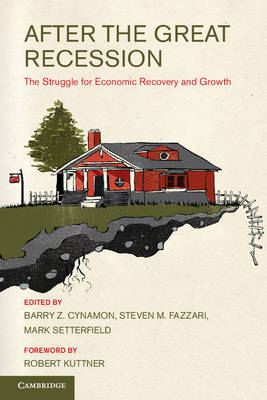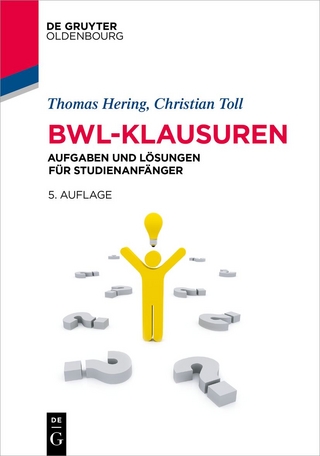
After the Great Recession
Cambridge University Press (Verlag)
978-1-107-01589-0 (ISBN)
The severity of the Great Recession and the subsequent stagnation caught many economists by surprise. But a group of Keynesian scholars warned for some years that strong forces were leading the US toward a deep, persistent downturn. This book collects essays about these events from prominent macroeconomists who developed a perspective that predicted the broad outline and many specific aspects of the crisis. From this point of view, the recovery of employment and revival of strong growth requires more than short-term monetary easing and temporary fiscal stimulus. Economists and policy makers need to explore how the process of demand formation failed after 2007 and where demand will come from going forward. Successive chapters address the sources and dynamics of demand, the distribution and growth of wages, the structure of finance and challenges from globalization, and inform recommendations for monetary and fiscal policies to achieve a more efficient and equitable society.
Barry Cynamon is a Research Associate at the Weidenbaum Center on the Economy, Government and Public Policy at the Washington University, St Louis. His early research on the US consumer age of the past quarter century linked rising household spending and debt to group interactions and cultural norms. This work was published in 2008, just as the 'risk of collapse' it identified played out to become known as the Great Recession. He has also published research on both monetary and fiscal policy and is Chief Financial Officer of GLC Investments, a renewable energy investment management firm. He holds an MBA from the University of Chicago. Steven Fazzari is Professor of Economics and Associate Director of the Weidenbaum Center on the Economy, Government and Public Policy at Washington University, St Louis. He received a Ph.D. in economics from Stanford University in 1982. The author of more than forty peer-reviewed journal articles and book chapters, Professor Fazzari's research explores two main areas: the financial determinants of investment and R&D spending by US firms and the foundations of Keynesian macroeconomics. His teaching awards include the 2002 Missouri Governor's award for excellence in university teaching, the 2007 Emerson Award for teaching excellence and Washington University's distinguished faculty award, also in 2007. Mark Setterfield is Professor of Economics at Trinity College, Hartford, Associate Member of the Cambridge Centre for Economic and Public Policy at the University of Cambridge, and Senior Research Associate at the International Economic Policy Institute, Laurentian University, Canada. He is the author of Rapid Growth and Relative Decline: Modelling Macroeconomic Dynamics with Hysteresis, the editor (or co-editor) of six volumes of essays, and has published on macroeconomic dynamics and Keynesian macroeconomics in journals including the Cambridge Journal of Economics, European Economic Review, the Journal of Post Keynesian Economics and The Manchester School.
Part I. Introduction and Overview: 1. Understanding the great recession Barry Z. Cynamon, Steven M. Fazzari and Mark Setterfield; 2. America's exhausted paradigm: macroeconomic causes of the financial crisis and great recession Thomas I. Palley; Part II. Emergence of Financial Instability: 3. Minsky's money manager capitalism: assessment and reform L. Randall Wray; 4. Trying to serve two masters: the dilemma of financial regulation Jan Kregel; 5. How bonus-driven 'rainmaker' financial firms enrich top employees, destroy shareholder value, and create systemic financial instability James Crotty; Part III. Household Spending and Debt: Source of Past Growth-Seeds of Recent Collapse: 6. The end of the consumer age Barry Z. Cynamon and Steven M. Fazzari; 7. Wages, demand and US macroeconomic travails: diagnosis and prognosis Mark Setterfield; Part IV. Global Dimensions of US Crisis: 8. Global imbalances and US trade in the great recession and its aftermath Robert Blecker; Part V. Economic Policy after the Great Recession: 9. Confronting the Kindleberger moment: credit, fiscal, and regulatory policy to avoid economic disaster Gerald Epstein; 10. Fiscal policy: the recent record and lessons for the future Dean Baker; 11. No need to panic about US government deficits Barry Z. Cynamon and Steven M. Fazzari; 12. Fiscal policy for the great recession and beyond Pavlina Tcherneva; Part VI. The Way Forward: 13. Demand, finance, and uncertainty beyond the great recession Barry Z. Cynamon, Steven M. Fazzari and Mark Setterfield.
| Vorwort | Robert Kuttner |
|---|---|
| Zusatzinfo | 15 Tables, unspecified; 19 Line drawings, unspecified |
| Verlagsort | Cambridge |
| Sprache | englisch |
| Maße | 157 x 235 mm |
| Gewicht | 600 g |
| Themenwelt | Wirtschaft ► Allgemeines / Lexika |
| Wirtschaft ► Betriebswirtschaft / Management ► Unternehmensführung / Management | |
| Wirtschaft ► Volkswirtschaftslehre ► Finanzwissenschaft | |
| Wirtschaft ► Volkswirtschaftslehre ► Makroökonomie | |
| Wirtschaft ► Volkswirtschaftslehre ► Wirtschaftspolitik | |
| ISBN-10 | 1-107-01589-8 / 1107015898 |
| ISBN-13 | 978-1-107-01589-0 / 9781107015890 |
| Zustand | Neuware |
| Haben Sie eine Frage zum Produkt? |
aus dem Bereich


